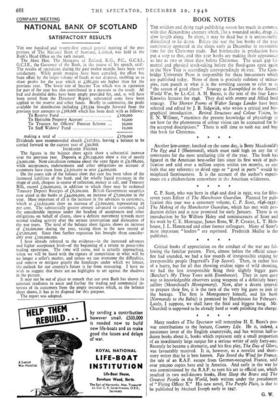THE stricken and dying 1946 publishing season has much in
common with that Alexandrine creature which, like a wounded snake, drags it slow length along. In short, it may be dead but it is unseasonably disinclined to lie dawn. Before the war the last books of the year customarily appeared in the shops early in December in reasonable time for the Christmas trade. But bottlenecks in production have put a stop to that, and this year books are making their appearance as late as two or three days before Christmas. The usual gap for mental and physical stock-taking before the flood-gates open again in the New Year is accordingly correspondingly shorter. The Cam- bridge University Press is responsible for three late-comers which are published today. None of them is precisely redolent of mince- pies, rum punch or what it is the revolting custom to refer to as " the season of good cheer." Strategy as Exemplified in the Second World War, by Lt.-Col. A. H. Burne, is the text of the four Lees- Knowles lectures for 1946. They deal with enemy and Allied land strategy. The Shorter Poems of Walter Savage Landor have been selected and edited by J. B. Sidgwick, who writes a critical and bio- graphical introduction. Retinal Structure and Colour Vision, by E. N. Willmer, " examines the present knowledge of physiology to see how far the phenomena of colour vision can be accounted for by the accepted descriptions." There is still time to rush out and buy this bock for Christmas.
Another late-corner, hatched on the same day, is Betty Macdonald's The Egg and 1 (Hammond), which must rank high on any list of contestants for the most unalluring •title of the year. The book has figured in the American best-seller lists since its first week of pub- lication and sold over a million copies within ten months, so one feels that any reference to dried eggs or " good in parts " would be misplaced facetiousness. It is the account of the author's experi- ences en a chicken-farm somewhere in the American wilderness.
* * * *
C. P. Scott, who was born in 1846 and died in 1932, was for fifty- seven years Editor of The Manchester Guardian. Planned for pub- lication this year was a centenary volume, C. P. Scott, 1846-1932: The Making of the Manchester Guardian, which has met with pro- duction delays and is now promised for early January. There is an introduction by Sir William Haley and reminiscences of Scott and his work by C. E. Montague, James Bone, W. P. Crozier, L. T. Hob- house, J. L. Hammond and other former colleagues. Many of Scott's most important " leaders " are reprinted. Frederick Muller is the
publisher. * * * *
Critical books of appreciation on the conduct of the war are fol- lowing the familiar pattern. First, almost before the official cease- fire had sounded, we had a few rounds of irresponsible sniping by irresponsible people (Ingersoll's Top Secret). Then, in rather less of a hurry, but for all that showing evident signs of wild shooting, we had the less irresponsible firing their slightly bigger guns (Butcher's My Three Years with Eisenhower). They in turn gave way to knowledgeable observers using weapons of a definitely heavy calibre (Moorehead's Montgomery). Now, after a decent interval to prepare their fire, it is the turn of the very big guns to join in the barrage. The first is Montgomery himself, and his book (Normandy to the Baltic) is promised by Hutchinson for February. Lastly, I suppose, we shall have the final and biggest bang. Mr. Churchill is supposed to be already hard at work polishing the charge.
* * * *
Many readers of The Spectator will remember H. E. Bates's pre- war contributions to the feature, Country Life. He is, indeed, a passionate lover of the English countryside, and has written half-a- dozen books about it, books which represent only a small proportion of an inordinately large output for a serious writer of only forty-one. Recently he became a dramatist, and his first play, The Day of Glory, was favourably received. It is, however, as a novelist and short- story writer that he is best known. Fair Stood the Wind for France, the tale of an R.A.F. escape from German-occupied France, sold over 500,000 copies here and in America. And early in the war he was commissioned by the R.A.F. to turn his art to official use, which resulted in two well-known books, How Sleep the Brave and The Greatest People in the World, both written under the pseudonym of " Flying Officer X." His new novel, The Purple Plain, is due to be published by Michael Joseph early in 1947.
G. W.


































 Previous page
Previous page